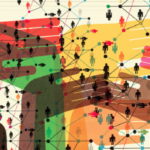As I sit to write this months’ article, I’m trying to wrap up some thoughts around unity. If you’ve read my last two pieces, we’ve talked about how meals give us a taste, and enactment of the Kingdom. Meals, simply, are how we extend the mission of the church. Meals point to fellowship, community. Finally, I want to connect meals to identity. As we meal-share with one another, it is the mission of the church to point to something greater. Meal sharing is an illustration and invitation to a new identity in Christ.
Meals as Promise
Last month we looked at the great banquet in Luke. We see the invitation of Christ modeling the inclusion of his fellowship. Many of the meals Jesus shared pointed to a greater promise, a picture of his Kingdom to come. In eating with others he showed what his Kingdom was really about. The Last Supper, the Great Banquet and finally, the Supper of the Lamb all point to a restoration of our identity. They are pieces of a puzzle stretched over time to remind us of the Kingdom we live for in the midst of the broken kingdom in where we live now. Meals symbolized a Hope to come, a Hope that Jesus was creating through his own body and brokenness. This pointed to a deeper truth that his disciples couldn’t understand. How was it that in His daily actions, Jesus was re-defining the Kingdom?
Luke tells us that it was through his meal sharing that Jesus demonstrated his identity. He revealed his divinity in several miracles that took place around food. In the feeding of the 5,000, he showed provision. In the meal at Emmaus, he points to his role as a suffering servant. At the Last Supper, he gives us a meal to extend our identity with him.
Tim Chester (A Meal with Jesus, 2011) writes, “The ministry of Jesus is the evidence of this future…the promise of a great reversal at the end of history” (p.133). Jesus is the dramatic undoing of all that is wrong in the world. Over and over in scripture the meals Jesus shared “become a call to action, to involvement, to participation. You can’t remain a passive observer” (p. 137).
Unity as Identity
Through the sharing of meals, Christ invites us into a new identity of the Kingdom. In redefining who we fellowship with and how we know Christ, he points to a deeper understanding of unity. He repositions the “Kingdom” as the way we love and relate to others. ‘Kingdom’ now becomes a mission, a demonstration of Christ’s sacrificial love for us. It is a glimpse of the future—where we will experience knownness and oneness in Christ.
Jesus describes this unity this way: He in the Father are one, and if we abide in Him, we are also in the Father. He pushes that identity into action—his call beckons a response. Just as we recognize Christ in ourselves, we are to seek it out in others. As we seek it out in others, we are to ‘love our neighbors as ourselves’. What Buber is pointing to is it’s recognizing the divinity in others as a reflection of God. Recognizing this divinity gives us a place to pursue unity.
Theologically, this presents itself in relationship as “I-Thou”. The Jewish philosopher, Martin Buber, correlates our ability to know and identify with others as an extension of how we know God. “I-thou”, is the highest level of relationship with the other. It is the wholeness of relating to another as “I” or equal to oneself. He states:
The Thou dwells in love as well as the I, for love ‘does not cling to the “ in such a way as the have the “Thou” only as object. To the man who loves, people are set free from their qualities as good or evil, wise or foolish and confront them in their singleness as Thou.
As we identify with Christ, we now identify with one another. Unity becomes the groundwork for relationship. No longer am I slave or free or female or male. No longer does my race, class or ethnicity matter, but unity—because I know Christ becomes my identity. Secularism pushes towards tolerance as a way of reconciling identity and diversity. Instead, as people of Christ we have a superseding identity which not only acknowledges, but reconciles our difference. We hold the identity of Christ as the justice for our broken identity.
Unity as the Kingdom
Re-identifying ourselves happens in small moments. It is choosing to respond to the narrative of the world and paint a picture of the Kingdom. Christian community in meals are a context for non-believers to taste and see our new identities in Christ. They are a reality of the kingdom embodied among us. In mean sharing we enact our Kingdom identity. “Every ‘thing’ else- redemption, creation, mission, identity, points to this: that we may eat in the presence of the God.
We proclaim Christ in mission so others may be invited to the feast.”






Missio Alliance Comment Policy
The Missio Alliance Writing Collectives exist as a ministry of writing to resource theological practitioners for mission. From our Leading Voices to our regular Writing Team and those invited to publish with us as Community Voices, we are creating a space for thoughtful engagement of critical issues and questions facing the North American Church in God’s mission. This sort of thoughtful engagement is something that we seek to engender not only in our publishing, but in conversations that unfold as a result in the comment section of our articles.
Unfortunately, because of the relational distance introduced by online communication, “thoughtful engagement” and “comment sections” seldom go hand in hand. At the same time, censorship of comments by those who disagree with points made by authors, whose anger or limited perspective taints their words, or who simply feel the need to express their own opinion on a topic without any meaningful engagement with the article or comment in question can mask an important window into the true state of Christian discourse. As such, Missio Alliance sets forth the following suggestions for those who wish to engage in conversation around our writing:
1. Seek to understand the author’s intent.
If you disagree with something the an author said, consider framing your response as, “I hear you as saying _________. Am I understanding you correctly? If so, here’s why I disagree. _____________.
2. Seek to make your own voice heard.
We deeply desire and value the voice and perspective of our readers. However you may react to an article we publish or a fellow commenter, we encourage you to set forth that reaction is the most constructive way possible. Use your voice and perspective to move conversation forward rather than shut it down.
3. Share your story.
One of our favorite tenants is that “an enemy is someone whose story we haven’t heard.” Very often disagreements and rants are the result of people talking past rather than to one another. Everyone’s perspective is intimately bound up with their own stories – their contexts and experiences. We encourage you to couch your comments in whatever aspect of your own story might help others understand where you are coming from.
In view of those suggestions for shaping conversation on our site and in an effort to curate a hospitable space of open conversation, Missio Alliance may delete comments and/or ban users who show no regard for constructive engagement, especially those whose comments are easily construed as trolling, threatening, or abusive.